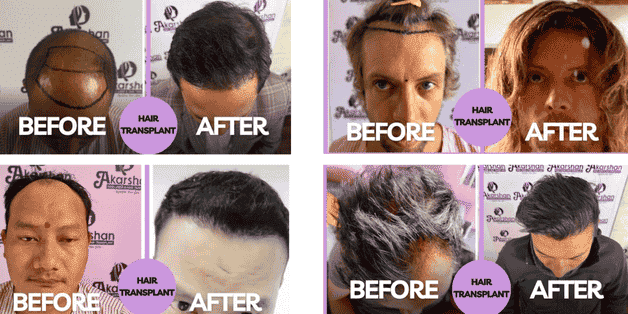Hair Clinic
Hair Transplant in Nepal
Are you searching for Hair Transplant in Nepal. Hair transplant is a surgical procedure that involves moving hair from one area of the scalp, usually the back or sides, to a bald or thinning area.
It involves taking hair follicles from one area of the body, often referred to as the “donor site,” and transplanting them to another area where hair growth is desired, known as the “recipient site.”
Hair grafts are typically removed from the sides and back of the scalp during scalp hair transplant surgery. Additionally, hair can be removed form the beard, chest, axilla, and other body areas for customers who have severe scalp baldness.
It is a popular cosmetic procedure for both gender who are experiencing hair loss and want to restore their hairline and hair thickness that has gained widespread recognition in recent years as an effective solution for hair loss. If you’re considering a hair transplant, it’s essential to understand the procedure and the benefits it offers.
Hair Transplant Techniques
Follicular Unit Transplant (FUT)
Follicular Unit Transplantation (FUT) is a known as strip harvesting, a surgical technique used in hair transplantation to address hair loss or thinning. It involves the removal of a strip of scalp from the donor area (usually the back or sides of the scalp) where the hair is more resistant to balding.
It allows for the harvesting of a larger number of grafts in a single session compared to other techniques like Follicular Unit Extraction (FUE). However, the removal of a strip of scalp, typically requires a longer recovery time compared to non-surgical hair restoration methods.
It may take a few weeks for the incision to heal completely & the patient needs to follow post-operative care instructions to minimize discomfort and promote healing.
Follicular Unit Extraction (FUE)
Follicular Unit Extraction (FUE) is a surgical technique used in hair transplantation. It is one of the primary methods used for hair restoration and is known for its ability to provide natural-looking results.
It involves removing a strip of scalp & individual extraction of hair follicles from the donor area. As it doesn’t leave a linear scar in the donor area instead, it creates small, circular scars that are less noticeable, especially when the hair is kept at a reasonable length.
This can be advantageous for individuals who prefer to wear shorter hairstyles and has a low risk of nerve damage. However it is more expensive than FUT & the intricate nature of the procedure, along with the time and skill required, can contribute to the higher cost.
Direct Hair Transplant (DHT)
This is the modern hair transplantation technique. It builds upon the principles of Follicular Unit Extraction (FUE) but incorporates some specific steps and tools for efficient and precise graft implantation.
DHT allows for the simultaneous extraction and implantation of hair follicles, reducing the time between these steps. This can help improve graft survival rates as the grafts spend less time outside the body.
The Choi implanter pen used in DHT offers precise control over the depth, angle, and direction of each implanted follicle. This allows for a more accurate and natural-looking hairline and overall hair distribution.

Hair transplant cost in nepal
Per Graft price of FUE (Follicular Unit Extraction) and DHT (Direct Hair Transplant)
| Graft | FUE | DHT |
|---|---|---|
| 1 | NRS 35 | NRS 45 |
| 1000 | NRS 35,000 | NRS 45,000 |
| 1500 | NRS 52,500 | NRS 67,500 |
| 2000 | NRS 70,000 | NRS 90,000 |
| 2500 | NRS 87,500 | NRS 1,12,500 |
| 3000 | NRS 1,05,000 | NRS 1,35,000 |
| 3500 | NRS 1,22,500 | NRS 1,57,500 |
| 4000 | NRS 1,40,000 | NRS 1,80,000 |
| 4500 | NRS 1,57,500 | NRS 2,02,500 |
| 5000 | NRS 1,75,000 | NRS 2,25,000 |
| 5500 | NRS 1,92,500 | NRS 2,47,500 |
| 6000 | NRS 2,10,000 | NRS 2,70,000 |
| 6500 | NRS 2,27,500 | NRS 2,92,500 |
| 7000 | NRS 2,45,000 | NRS 3,15,000 |
Why do we use it?
This hair transplantation procedure in Akarshan is performed by a qualified and experienced specialist and can be performed using different techniques that are available in Nepal such as Direct Hair Implantation (DHI), Follicular Unit Extraction (FUE) & Direct Hair Transplantation (DHT).
The patient’s hair loss pattern, the accessibility of donor hair, and individual preferences are just a few of the variables that influence the decision between FUT, FUE and DHT . When carried out by qualified surgeons here in Akarshan, all these three methods can produce results that look natural.
Here in Akarshan, hair transplant can be an effective and permanent solution for hair loss, it provides improved hair density and restoring a more youthful appearance.
However, here are qualified hair transplant specialist of best hair transplant clinic in nepal to determine your suitability for the procedure and discuss expectations, potential risks, and any other relevant factors specific to your case.
Frequently Asked Question
What is the Cost of Hair Transplant in Nepal?
Generally, it starts from NRP 30 to 45 per graft. DHT cost NRP 45 and FUE cost NRP 35 per graft. The total cost can be calculated only after your first consultation with the doctor.
How much time will take on Hair Transplant in Nepal?
A duration on Hair Transplant normally takes 4 to 8 hours or even longer in some cases.
Is Hair Transplant safe ?
In general, hair transplant procedures are be safe and effective in Akarshan as it is performed by qualified and experienced professionals.
Do Hair Transplant last forever?
Yes, hair transplants can provide permanent results as the transplanted hair follicles are typically resistant to genetic hair loss.
Do Hair Transplant look natural?
In short, when performed by a skilled surgeon, hair transplants can achieve natural-looking results.
What should i need to avoid after Hair Transplant?
After a hair transplant, it is generally advisable to avoid strenuous physical activity, exposure to direct sunlight, smoking, alcohol consumption, and certain medications that can interfere with the healing process. Additionally, it’s important to follow the post-operative care instructions provided by your surgeon for optimal healing and successful results.
Does Hair Transplant fall after 1 year transplant?
No, hair transplant does not fall out after one year. After the hair transplant procedure, it is common for the transplanted hair to shed within a few weeks.
This shedding is a normal part of the hair growth cycle and is not a cause for concern. After the shedding phase, new hair growth should start within a few months. The newly transplanted hair will then gradually grow and thicken over time.



